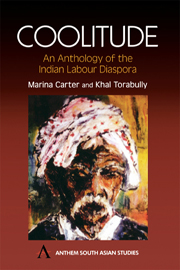Book contents
- Frontmatter
- Contents
- Introduction
- The Coolie Odyssey: A Voyage In Time And Space
- Thrice Victimized: Casting The Coolie
- Surviving Indenture
- Reclaiming The ‘Other’: Diaspora Indians And The Coolie Heritage
- Some Theoretical Premises Of Coolitude
- Conclusion: Revoicing the Coolie
- Poetic And Critical Texts Of Coolitude
- Notes
- Bibliography
Reclaiming The ‘Other’: Diaspora Indians And The Coolie Heritage
Published online by Cambridge University Press: 05 March 2012
- Frontmatter
- Contents
- Introduction
- The Coolie Odyssey: A Voyage In Time And Space
- Thrice Victimized: Casting The Coolie
- Surviving Indenture
- Reclaiming The ‘Other’: Diaspora Indians And The Coolie Heritage
- Some Theoretical Premises Of Coolitude
- Conclusion: Revoicing the Coolie
- Poetic And Critical Texts Of Coolitude
- Notes
- Bibliography
Summary
Coolies had a culture of the written word, and they set off on their voyage with books: the Qur'an, the Bhagavad Gita and the Ramayana. These sacred texts were part and parcel of their journey … a struggle against deculturation took place. Coolies clung to their founding texts.
K Torabully, 1996, p. 15.The coolie was never the passive instrument of the colonialist imagination or the historian's pen. The coolie was not forever condemned to be famine victim, dully toiling with the hoe, helpless to eradicate the burden of a momentary hunger. The indenture experience was not static and the coolie's adjustments and aspirations carried a first-generation of migrants forward, beyond the indenture contract, towards the hopes of prosperity, ownership and return. For many years, however, ‘coolie’ was a symbol of economic degradation and social submissiveness, and the descendants of coolies felt themselves to be equally stigmatized, exoticized and ostracized. The reclamation of the ‘coolie’ and the transformation of the indenture heritage is an ongoing process.
In most of the colonies to which indentured Indians migrated, and where subsequent or pre-existing mercantile communities from India also settled, the latter made strenuous efforts to disassociate themselves from the negatively stereotyped ‘coolie’. For example, in 1888 a group of Indian merchants in Johannesburg urged the government to resist agitators who sought ‘to class your petitioners with Arabs, Coolies, or Chinese not suitable to do business in this State … your petitioners assure your Excellencies that they are none of these people and have nothing in common with them.’
- Type
- Chapter
- Information
- CoolitudeAn Anthology of the Indian Labour Diaspora, pp. 117 - 142Publisher: Anthem PressPrint publication year: 2002



